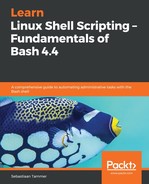While the mail spam has been eliminated, now you find yourself without any output at all, which is definitely not a good thing either. Luckily for us, we've learned all about redirection in Chapter 12, Using Pipes and Redirection in Scripts. Just as we can use redirect within scripts or on the command-line, we can use the same constructs in a crontab. The same rules for ordering of pipes and stdout/stderr apply, so we can chain whatever command we want. Before we show this, however, we'll show one more cool functionality of crontab: instantiating a crontab from a file!
reader@ubuntu:~/scripts/chapter_14$ vim base-crontab
reader@ubuntu:~/scripts/chapter_14$ cat base-crontab
SHELL=/bin/bash
PATH=/usr/local/sbin:/usr/local/bin:/usr/sbin:/usr/bin:/sbin:/bin:/snap/bin
MAILTO=""
# m h dom mon dow command
reader@ubuntu:~/scripts/chapter_14$ crontab base-crontab
reader@ubuntu:~/scripts/chapter_14$ crontab -l
PATH=/usr/local/sbin:/usr/local/bin:/usr/sbin:/usr/bin:/sbin:/bin:/snap/bin
MAILTO=""
# m h dom mon dow command
First, we create the base-crontab file, which contains our Bash SHELL, the PATH (which we trimmed a little), the MAILTO variable, and our syntax header. Next, we use the crontab base-crontab command. Simply put, this replaces the current crontab with the contents from the file. This means we can manage the crontab as a file now; this includes support for version control systems and other backup solutions. Even better, when using the crontab <filename> command, syntax checking is intact. If the file isn't proper crontab format, you'll see the error errors in crontab file, can't install. Should you wish to save the current crontab to a file, the crontab -l > filename command will do the trick for you.
Now that that's out of the way, we'll give some examples of redirection for commands run by the crontab. We'll always instantiate from a file, so that you can easily find these materials on the GitHub page:
reader@ubuntu:~/scripts/chapter_14$ cp base-crontab date-redirection-crontab
reader@ubuntu:~/scripts/chapter_14$ vim date-redirection-crontab
reader@ubuntu:~/scripts/chapter_14$ cat date-redirection-crontab
SHELL=/bin/bash
PATH=/usr/local/sbin:/usr/local/bin:/usr/sbin:/usr/bin:/sbin:/bin:/snap/bin
MAILTO=""
# m h dom mon dow command
* * * * * date &>> /tmp/date-file
reader@ubuntu:~/scripts/chapter_14$ crontab date-redirection-crontab
reader@ubuntu:~/scripts/chapter_14$ tail -f /tmp/date-file
Sat Dec 1 15:01:01 UTC 2018
Sat Dec 1 15:02:01 UTC 2018
Sat Dec 1 15:03:01 UTC 2018
^C
reader@ubuntu:~/scripts/chapter_14$ crontab -r
Now, that was pretty easy. As long as our SHELL, PATH, and MAILTO are properly set, we have avoided a lot of issues that are normally experienced when people start working with scheduling via the crontab.
One thing we have not done yet is run a script with the crontab. So far, only single commands have been run. However, a script will run just as great. We'll use a script from the previous chapter, reverser.sh, which will show that we can supply arguments to scripts via the crontab as well. Furthermore, it will show that the redirection we just learned works for script output just as well:
reader@ubuntu:~/scripts/chapter_14$ cp base-crontab reverser-crontab
reader@ubuntu:~/scripts/chapter_14$ vim reverser-crontab
reader@ubuntu:~/scripts/chapter_14$ cat reverser-crontab
SHELL=/bin/bash
PATH=/usr/local/sbin:/usr/local/bin:/usr/sbin:/usr/bin:/sbin:/bin:/snap/bin
MAILTO=""
# m h dom mon dow command
* * * * * /home/reader/scripts/chapter_13/reverser.sh 'crontab' &>> /tmp/reverser.log
reader@ubuntu:~/scripts/chapter_14$ crontab reverser-crontab
reader@ubuntu:~/scripts/chapter_14$ cat /tmp/reverser.log
/bin/bash: /home/reader/scripts/chapter_13/reverser.sh: Permission denied
reader@ubuntu:~/scripts/chapter_14$ crontab -r
Ouch! After all our careful preparation, we still messed up here. Fortunately, the output file we created (which functions as a log file, and has the .log extension because of it) also has stderr redirected (because of our Bash 4.x &>> syntax) and we see what the error is. A classic error, Permission denied in this case simply means that we are trying to execute a non-executable file:
reader@ubuntu:~/scripts/chapter_14$ ls -l /home/reader/scripts/chapter_13/reverser.sh
-rw-rw-r-- 1 reader reader 933 Nov 17 15:18 /home/reader/scripts/chapter_13/reverser.sh
So, we need to fix this. We can do two things:
- Make the file executable with (for example) chmod 755 reverser.sh.
- Change the crontab from reverser.sh to bash reverser.sh.
In this case, there is not really a good or bad solution. On the one hand, it is always a good idea to mark files that need to be executed as executable; this conveys to someone seeing the system that you intended this. On the other hand, if the extra bash command in the crontab can save you from these types of issues, what is the harm in that?
In our opinion, there is slightly more merit in making the file executable and omitting the bash command in your crontab. This keeps the crontab cleaner, (and, from experience, crontabs can easily become a mess if mishandled, so this is a very big plus), and shows someone else looking at the script that it should be executed because of the permissions. Let's apply this fix to our machine:
reader@ubuntu:~/scripts/chapter_14$ chmod 755 ../chapter_13/reverser.sh
reader@ubuntu:~/scripts/chapter_14$ crontab reverser-crontab
reader@ubuntu:~/scripts/chapter_14$ tail -f /tmp/reverser.log
/bin/bash: /home/reader/scripts/chapter_13/reverser.sh: Permission denied
Your reversed input is: _batnorc_
^C
reader@ubuntu:~/scripts/chapter_14$ crontab -r
There, much better. The full command that we run in the crontab is /home/reader/scripts/chapter_13/reverser.sh 'crontab' &>> /tmp/reverser.log, which includes the word crontab as the first argument to the script. The output, _batnorc_, is indeed the reversed word. It would seem that we can correctly pass arguments via the crontab! While this example illustrates the point, it might not get across while this might be significant. However, if you imagine a generic script that is normally used multiple times with different arguments, it could be present with those different arguments in the crontab as well (on multiple lines, perhaps with different schedules). Very useful indeed!
